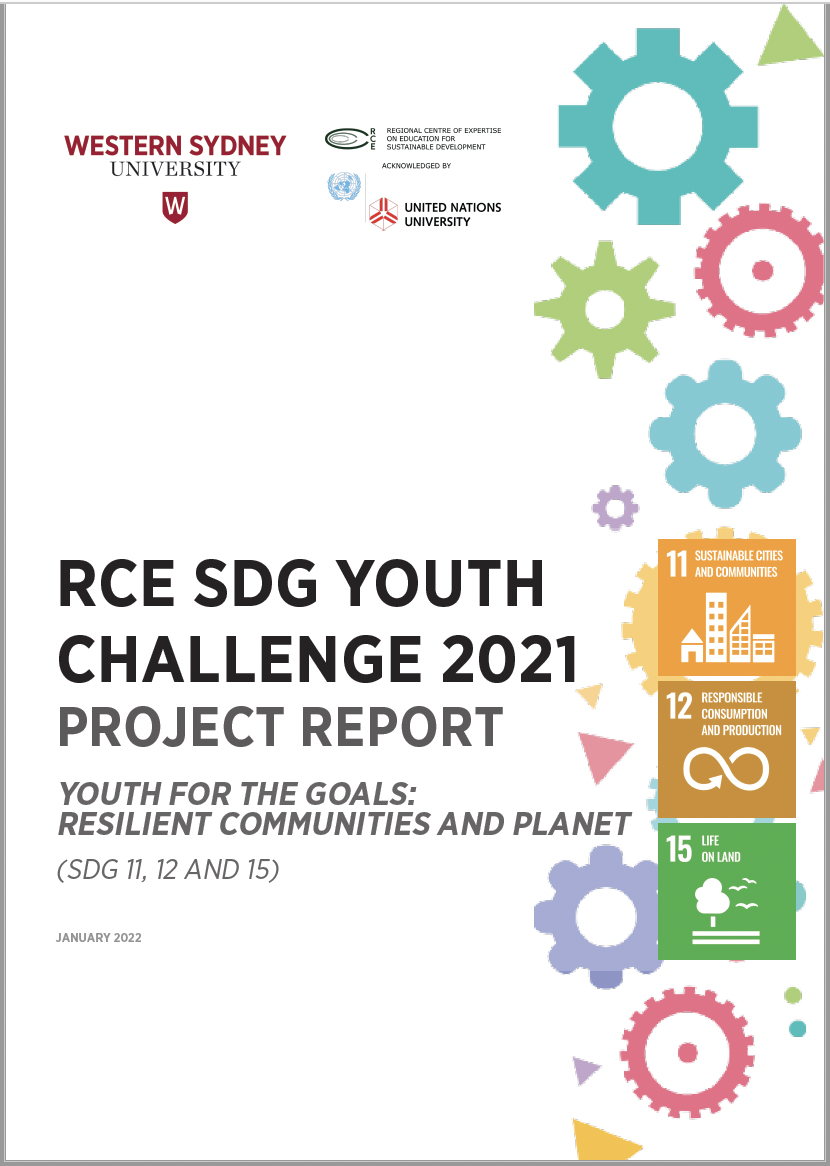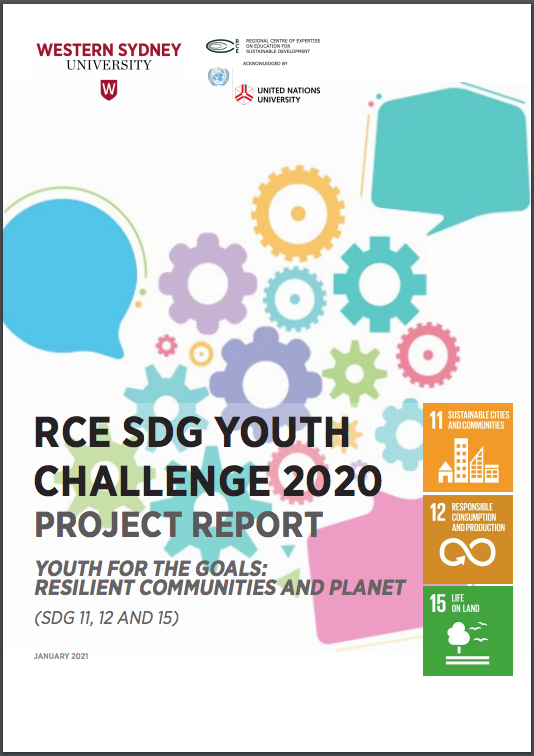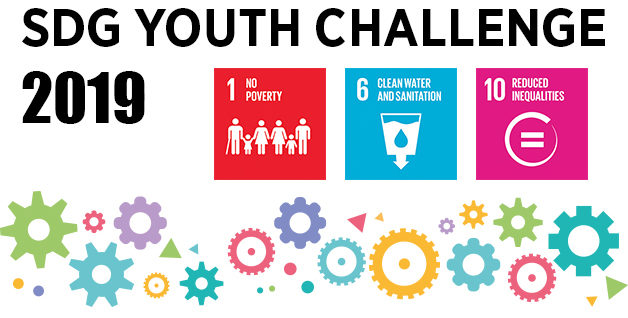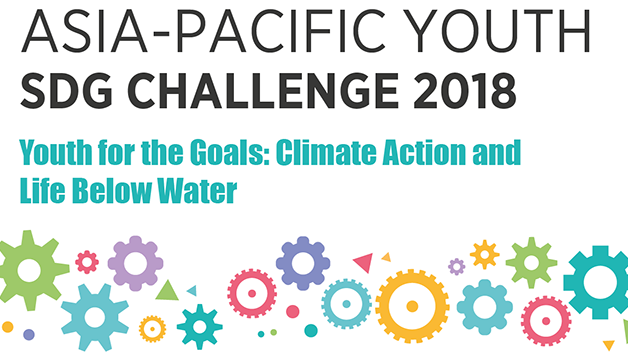Reports and Other
 RCE SDG Youth Challenge: 2021 Final Report
RCE SDG Youth Challenge: 2021 Final Report
The 4th RCE SDG Youth Challenge 2021 focused on localised action taken by youth to address SDG 11 (Sustainable Cities and Communities), SDG 12 (Responsible Consumption and Production) and SDG 15 (Life on Land), and their associated targets. This theme carried over from 2020 due to the impacts of COVID-19 on many youth-led projects. This year's youth-led sustainability projects have been broad and included education awareness raising, youth empowerment and training, conservation projects and social enterprises. The youth written report highlights the youth-led projects' outcomes and achievements as written by them and endorsed by their parent RCEs or organisation. Read the final report here.
 Asia-Pacific SDG Youth Challenge: 2020 Final Report
Asia-Pacific SDG Youth Challenge: 2020 Final Report
The RCE SDG Youth Challenge 2020 focused on localised youth action to address SDGs 11, 12 and 15. Commencing in February 2020, and hosted by RCE Greater Western Sydney (Western Sydney University), the Challenge’s youth-led sustainability projects were quite broad and included virtual workshops and training, restoration activities, design competitions, e-learning activities, and policy contributions, engaging almost 6,500 youth. The report 'Youth for the Goals: Resilient Communities and Planet' highlights their achievements. Read the final report here.
 Asia-Pacific SDG Youth Challenge: 2019 Final Report
Asia-Pacific SDG Youth Challenge: 2019 Final Report
The 2019 Asia-Pacific SDG Challenge 'Youth for the Goals' aimed to inspire and mobilise on-the-ground projects led by youth, centred around social sustainability (SDGs 1, 6 and 10). Collectively it achieved an engagement of nearly 8,000 youth participants across the Asia-Pacific region and beyond. The final report is now available and is a wonderful celebration of the achievements of all youth involved! Read the final report here.
 Asia-Pacific SDG Youth Challenge: 2018 Final Report
Asia-Pacific SDG Youth Challenge: 2018 Final Report
The first Asia-Pacific SDG Challenge held in 2018, ‘Youth for the Goals: Climate Action and Life Below Water’ aimed to inspire and mobilise on-ground projects led by youth, centred around SDGs 13 and 14. Collectively it achieved an engagement of nearly 40,000 youth participants across the Asia-Pacific region. The final report is now available and is a wonderful celebration of the achievements of all youth involved! Read the final report here.
International Council for Science
Review of Targets for the Sustainable Development Goals: The Science Perspective (2015)
Download the report here.
Global Sustainable Development Report 2015
The 2015 Global Sustainable Development Report was launched in June and contributed to the 2015 session of the High Level Political Forum (HLPF) on Sustainable Development. Following the approach piloted for the preparation of the Prototype and the mandate given at Rio+20, the general approach to the 2015 edition of the GSDR report is that of an assessment of assessments, documenting and describing the landscape of information on specific issues. The report is global in coverage while taking into account the perspectives of the five UN regions. Extensive inputs were sought from the UN system, government officials and stakeholders at all levels, including representatives of academies of sciences, of key international assessments, and relevant UN expert groups. For the full report click here. You will also find briefs of each chapter and side event information on the same website.
RCE Structure and Governance Survey: An Analysis of Results and Recommendations
When RCE Greater Portland formed its regional network in 2013, its coordinators wanted to know if there was an ideal governance structure that Regional Centres of Expertise (RCE) on ESD had discovered. With the current acknowledgement of 146 RCEs by the UNU-IAS around the world, there remains a paucity of research on whether a particular form of governance has been identified as most effective.
When we asked our RCE colleagues how we should organize RCE Greater Portland, we frequently were told that the model depended on the needs of the community and the resources available and, therefore, RCE governance structures varied. These variations seemed like the perfect opportunity for research and analysis.
This survey was developed to collect information on the varying types of existing RCE governance and management models, for the benefit of self-reflection for existing RCEs and to help inform new RCEs on recommended practices. Using a Survey Monkey tool, RCE Greater Portland leaders, Kim Smith and Jamie Stamberger, designed questions that they found to be core considerations and obstacles to their own RCE development. Given that organizational structures and governance models vary, this survey explores whether there are particular systems, practices, and challenges that RCE leaders think new RCEs should consider to sustain their organizations and enhance engagement.
The full survey and its conclusions can be downloaded here.
Journal of Education for Sustainable Development (JESD)
CEE brings out the ‘Journal of Education for Sustainable Development’ (JESD). JESD is a forum for academics and practitioners to share and critique innovations in thinking and practice in the emerging field of ESD. A peer-reviewed international journal, JESD aims at global readership and is published twice a year. The latest issue (September 2016) focused on SDGs. Read more
The International Journal of Sustainability in Higher Education (IJSHE)
IJSHE is the first international scholarly publication to specifically address the need for documentation and the dissemination of research, studies and projects on sustainability matters at higher education institutions. In 2017, the journal is interested to review more papers focusing on innovation on sustainable development at universities. Read more
Report - Projecting progress: are cities on track to achieve the SDGs by 2030?
This report by the Overseas Development Institute explores the scale of the challenge for 20 cities across the world to reach selected targets set out in the SDGs. Read more


